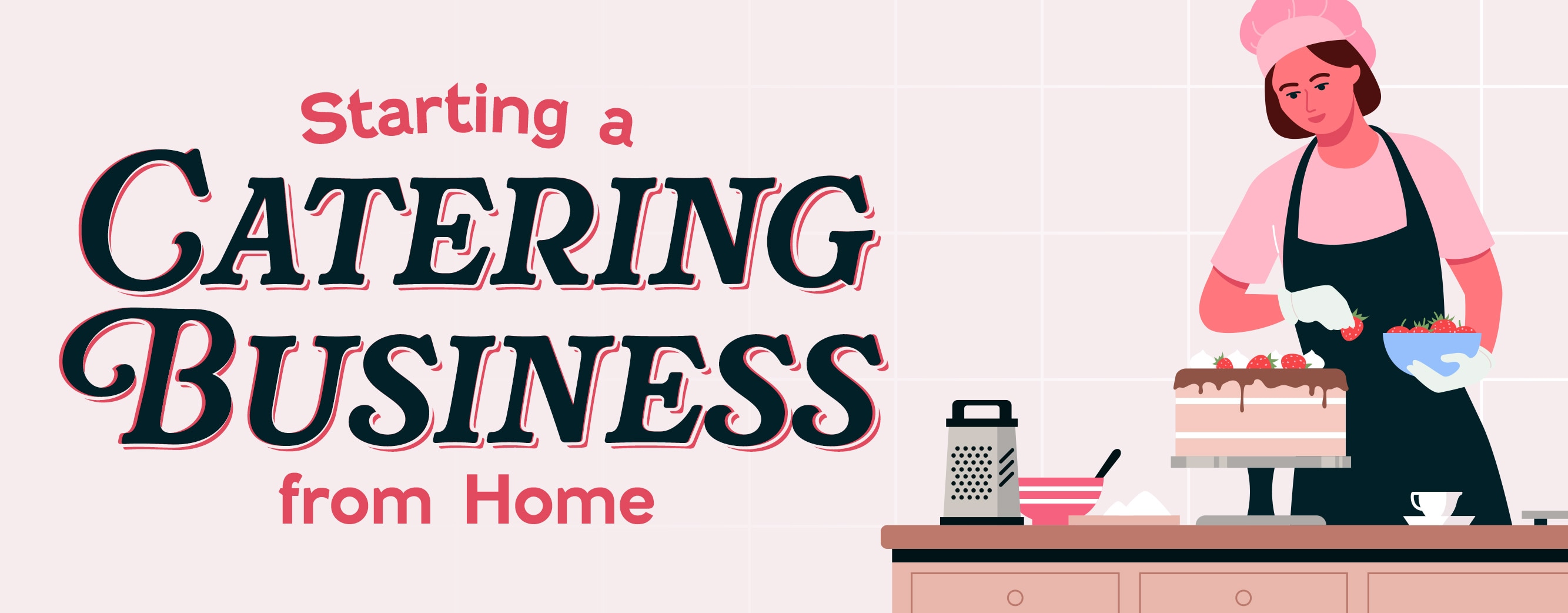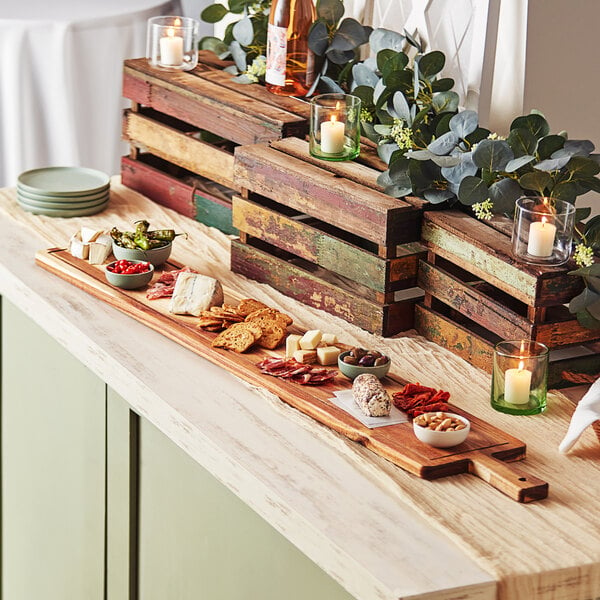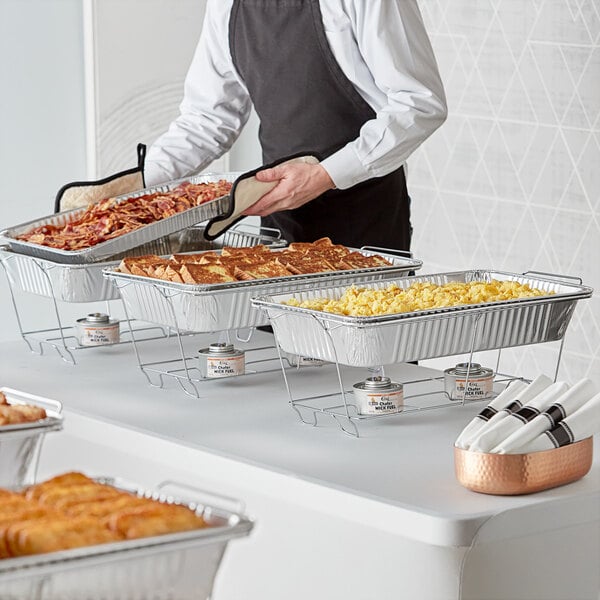
Starting a catering business from home can be a strategic way to test the success of your venture without the typical start-up fees and overhead associated with a commercial catering operation. This approach lets you to enter the industry with lower financial risk, allowing you to establish your brand, perfect your menu, and build a loyal customer base. By starting small and gradually expanding your business, you can lay a solid foundation for future growth and success in the catering industry. Our startup guide provides a comprehensive overview of the essential steps to launch a home-based catering business.
Shop All Catering Supplies1. Research Your State’s Regulations
Before starting a home catering business, it is crucial to determine if your state permits residents to prepare and sell food from their homes. Regulations for home-based food businesses differ significantly across states, so thorough research is essential before launching your venture. Visit your state's Department of Health website to familiarize yourself with the laws governing home food production, often known as "cottage food laws," to ensure compliance and legality.
What Are Cottage Food Laws?

Cottage food laws provide individuals with the opportunity to legally start a food business from their own kitchen, without the typical requirements of operating in a commercial kitchen. These laws are designed to support small-scale food entrepreneurs by allowing them to sell certain types of homemade goods directly to consumers. Cottage food laws are designed for very small businesses, with many states putting a cap on how many thousands of dollars in revenue your business can make before you have to open a commercial or retail establishment.
Under cottage food laws, the types of food that can be made are typically limited to those that pose a low risk of food contamination. This means that potentially hazardous foods, such as those requiring temperature control for safety (TCS foods), are often restricted. Examples of foods commonly allowed under cottage food laws include baked goods, jams and jellies, granola, and certain candies.
Always check your state’s cottage food regulations, rules, and codes to see what food you can make, what licenses are required, local zoning laws, local health department’s requirements, and if labeling is required to sell food. It is also imperative to check your local zoning laws so that you are not fined or shut down for opening a catering business in an area zoned for residences.
2. Apply for Licenses and Permits
To legally operate a catering business from home, you must obtain the necessary licenses and permits. The types of licenses and permits required vary by state, but common ones include a business license and a food handler's permit. Check with your local health department and business regulatory agency to determine the specific requirements in your area. Compliance with these regulations is crucial to ensure the success and legitimacy of your home-based catering business.
Potential Home-Based Catering Licenses
Before starting your home-based catering business, be sure to research the specific licensing requirements in your area. Here are some potential licenses you may need to consider:
- General Business License: Every business in the United States is required to acquire a business license to operate.
- Employer Identification Number: To receive a tax ID number and hire employees, an EIN is needed. This is issued by the IRS.
- Food Handler Permit: A food handler permit shows that you and your employees are familiar with and practice safe food handling practices in your business.
- Cottage Food License: This license allows you to sell homemade food products directly to consumers. A specific cottage food license does not exist in every state.
- Caterer Permit: In some states, a catering permit is needed along with a food handling permit, allowing you to distribute food safely as a certified catering company.
- Home Occupation Permit: You’ll likely need a home occupation permit to legally certify your home as your business’s headquarters.
- Catering Business Insurance: You’ll want liability insurance to protect your business from potential “what if’s”. These usually cover accidents, auto incidents, workers’ compensation, and property damage. You also may need to contact and update your homeowner’s insurance.
- Liquor Licenses: If you’re offering bar services, you’ll need a liquor license and liquor liability insurance.
Check If You Need a Health Inspection
Depending on your location, some states may require a local health inspector to visit your kitchen before approving your license. This inspection ensures that your food preparation area meets the necessary health and safety standards. For most states that require an inspection, it is a one-time pre-operational inspection. However, some do require annual inspections. If your home has a private water supply (well water), you may also need to submit a water test to ensure it's safe to consume.
3. Choose a Catering Concept
Once you’ve determined the legality of starting a catering business from home, it's time to define your concept. This involves identifying your target market and niche to differentiate yourself in the competitive catering industry. Consider the type of customers you’re interested in pursuing and the event size you'll be able to handle. Here are a few potential customer groups who might consider hiring a catering service:
- Weddings: intimate, destination, or traditional
- Social Events: birthday, retirement, and graduation parties
- Corporate: conferences, cocktail parties, and office breakfasts and lunches
- Personal: cooking a meal in someone’s home for a small gathering or date night
Identify Your Target Market
Identifying your target market involves researching and analyzing the demographics, preferences, and behaviors of potential customers. Consider factors such as age, income level, dietary preferences, and event types when defining your target market. This will help you develop a clear understanding of who your ideal customers are and how to effectively market your services to them.
In addition to defining your target market, it's essential to choose a niche for your catering business. A niche allows you to specialize in a specific area of catering, making you stand out from competitors and appeal to a more focused customer base. Your niche could be based on cuisine type, event size, dietary restrictions, or any other unique selling proposition that sets you apart in the market.
Craft Your Menu

Your menu will be the centerpiece of your business and will define the type of catering services you offer. Before creating your menu, determine what you want to specialize in. Will you focus on gluten-free or vegan foods to cater to specific dietary preferences? Or will you offer a variety of options to cater to a broader audience? You may want to focus on a specific style of cuisine, such as barbecue and Southern comfort food, charcuterie boards, or mini desserts. Additionally, consider whether you want to include alcohol catering as part of your services. Providing alcohol options can enhance the overall dining experience for your clients.
When deciding your menu's size, aim for a balance between variety and manageability. A menu that is too extensive may be challenging to execute efficiently, especially when working from a home kitchen. Start by offering a selection of dishes that showcase your culinary skills and cater to your target market's preferences. As your business grows, you can expand your menu offerings based on customer feedback and demand.
Determine Your Pricing
Consider your concept and your target market when determining your pricing to ensure it aligns with the value you provide. High-end, specialized catering services may command higher prices, while more casual or budget-friendly options will have different pricing structures. Your prices should be competitive enough to attract customers, yet still allow you to generate a profit. In addition to your target market, you must also consider various factors like ingredients cost, labor, utilities, and transportation that contribute to the overall cost of running your business when setting your prices.
4. Write a Catering Business Plan
A well-crafted business plan can break down your vision into manageable tasks. Whether or not you intend to present it to others, developing a business plan is a valuable tool to guide your planning and turn your business idea into reality. We’ve added the most common points you’ll want to include in your catering company business plan.
- Executive Summary: This section will recap the highlights of your business plan, including your business concept, target market, and financial projections, so it is often easier to write it last.
- Company Overview: Provide detailed information about your catering business, including its mission, vision, values, and legal structure.
- Concept and Menu: Explain your concept, what sets you apart, and what niche you will be filling with your menu selections.
- Management and Ownership Structure: Outline the organizational structure, detailing whether you will be the sole operator of the business or if you will have managers working under your direction.
- Staffing Needs: If you plan on hiring employees, detail how many you’ll need to start with and what positions they need to fulfill.
- Competitor Analysis: Share your research on the competitors in your area, including their strengths and weaknesses, and who your target customers will be. Analyze industry trends and develop a strategy for positioning your business effectively within the market.
- Advertising and Marketing: Share your marketing plans, including social media strategies, website design, and any events you may attend to engage with potential clients.
- Financial Summary: Provide a breakdown of your financial projections, including start-up costs, regular expenses, and profit margins.
5. Get the Right Equipment

When starting a catering business from home, it’s essential to evaluate the equipment you have on hand and determine if any additional items are needed to meet your catering needs. While you likely won’t have to make significant changes to your kitchen setup, investing in high-quality kitchen smallwares, cutlery, and tools can enhance your catering operations. Here is a list of potential equipment you may need:
- Refrigerator/Freezer: A separate refrigerator and freezer for your catering business will help you store ingredients and prepared dishes separately from your personal food items, ensuring food safety and organization.
- Reusable or Disposable Chafing Dishes and Chafing Dish Fuel: Chafing dishes are essential for keeping food warm during events. Consider investing in reusable chafing dishes if you plan to cater more upscale events or use disposable options for casual events. Stock up on chafing dish fuel to keep your dishes hot throughout the event.
- Serving Utensils: Quality serving utensils, such as tongs, ladles, and serving spoons, are essential for plating and serving food at events. Having a variety of utensils in different sizes and styles will help you cater to different types of dishes.
- Insulated Food Pan Carriers: To ensure that your dishes remain at the proper temperature during transportation, invest in insulated food pan carriers. These carriers come in various sizes and configurations to accommodate different types of food pans and trays.
- Carts and Kiosks: Equipment like plastic bus carts and vending kiosks provide flexibility and mobility to catering operations.
Depending on the level of service you'd like to provide and the types of events you'd like to cater to, you could need to stock up on more equipment and tools. Check out our catering supplies guide for a complete list of catering essentials.
6. Create a Website
Your website should serve as a virtual storefront showcasing your offerings and providing prospective customers with essential information. Focus on making the website visually appealing and easy to navigate. Potential clients should be able to find the information they need quickly and effortlessly. Ensure the layout is clean and organized, with a clear menu to direct visitors to the different sections of your site. Below are some necessary pages to include on your website:
- Menu Page: Include a detailed menu on your website that showcases the variety of dishes, cuisines, and catering packages you offer. This will give potential clients a taste of your culinary expertise and help them decide if your catering services align with their needs. This page should also include your prices.
- Contact Page: Make it easy for visitors to reach out to you by providing multiple contact options, such as a phone number, email address, and contact form. Promptly responding to inquiries can help convert leads into clients.
- About Page: Include an "About" section on your website that details how your catering business came about and highlights any relevant experience you have in the industry. Share your passion for food and catering, along with any certifications or training that demonstrate your expertise and establish credibility.
Be sure to optimize your website for search engines to improve visibility and attract customers searching for caterers in your area. Create a free listing on Google My Business to make your website easy to find and keep customers up-to-date on your hours, address, phone number, and reviews.
7. Hire Staff

If you’re looking to cater larger events and parties, you’ll likely need kitchen or serving staff to help you. Having a team to assist with food preparation, cooking, serving, and cleanup can make your catering operations run more smoothly and efficiently. Consider these factors when recruiting employees for your home-based catering business:
- Determine Your Staffing Needs: Assess the size and nature of the events you plan to cater to determine the number of staff required. Consider whether you need kitchen staff for food preparation or serving staff for events.
- Recruit Reliable Team Members: Look for individuals with relevant experience in the foodservice industry or a passion for hospitality. Seek out reliable candidates with good communication skills who can work well under pressure.
- Provide Training: Ensure that your staff members are trained in food safety, proper serving techniques, and customer service. Training your team will help maintain high-quality standards and ensure smooth operations during events.
- Establish Clear Roles and Responsibilities: Clearly define the roles and responsibilities of each staff member to avoid confusion and ensure efficient teamwork. Assign tasks based on individual strengths and expertise.
8. Advertise Your Home-Based Catering Business
By leveraging word-of-mouth marketing and establishing a strong social media and community presence, you can effectively advertise your home-based catering business and attract a steady stream of customers. Promoting your services through these channels will help you build brand awareness, generate leads, and ultimately grow your business. Try some of the following strategies to draw attention to your new business:
- Post Flyers: Create eye-catching flyers to promote your home-based catering business. Distribute them in your neighborhood, local businesses, and community centers to attract potential customers.
- Establish a Social Media Presence: Utilize social platforms like Instagram and TikTok to showcase your culinary skills and offerings. Post high-quality photos and videos of your dishes to engage with a wider audience and increase brand visibility.
- Join Community Facebook Groups: Join local community Facebook groups and promote your new catering business. Consider offering exclusive deals or discounts to group members to generate interest and attract new clients.
- Attend Farmer's Markets or Food Festivals: Participate in farmer's markets or food festivals to promote your business and showcase a sample of your menu. This is a great way to network with potential customers, gain exposure, and receive feedback on your offerings. It’s important to note that you may need additional permits to attend these events.
- Encourage Reviews: Word-of-mouth marketing is a powerful tool for any catering business, especially when starting from home. Encourage satisfied customers to spread the word about your services to their friends, family, and colleagues. Positive recommendations can significantly impact your business's reputation and attract new clients.
Back to Top
Starting a catering business from home can become a reality with the right planning and careful review of your state and local laws. By understanding the regulations and requirements that govern home-based catering operations, you can ensure your business is compliant and set up for success. After addressing all legal aspects, conduct market research and select a niche for your business.





